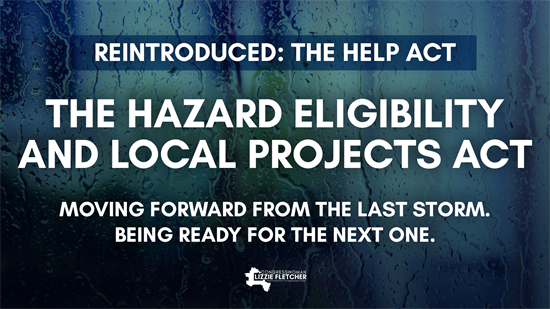Press Releases
Following Texas Winter Storm, Reps. Lizzie Fletcher, Michael McCaul Renew Bipartisan HELP Act to Expedite Recovery Process After Natural Disasters
Washington,
March 17, 2021
Following last month’s winter storm, Congresswoman Lizzie Fletcher (TX-07) reintroduced her legislation, the Hazard Eligibility and Local Projects (HELP) Act to help expedite disaster mitigation projects after natural disasters. The HELP Act eliminates unnecessary bureaucratic delays to beginning recovery projects by allowing certain eligible disaster mitigation projects to begin without the risk of losing potential federal funds. Congressman Michael McCaul (TX-10) is an original co-sponsor of the legislation. “As this year’s winter storm reminds us, the ability to respond quickly after a disaster is so important for communities,” said Congresswoman Lizzie Fletcher. “I am glad to reintroduce the bipartisan HELP Act in the 117th Congress with my colleague Congressman McCaul to allow certain disaster mitigation and recovery projects to begin more quickly without jeopardizing potential federal funding. The HELP Act provides a straightforward solution to a real problem that will have a meaningful impact at home and across the country after disasters. I thank my colleagues for joining with me to make this improvement to the disaster recovery process.” “I’m glad to join my friend Congresswoman Fletcher to speed up the process of key flood prevention projects by eliminating bureaucratic red tape without the risk of losing federal funds. Texans are unfortunately too familiar with natural disasters and this key legislation will help ensure we streamline mitigation measures to protect our communities for the years to come,” said Congressman Michael McCaul. Under current law, local and state agencies applying for federal funds to begin recovery projects must wait until they receive approval from the Federal Emergency Management Agency (FEMA) before purchasing land or starting construction on a project. Purchasing land or starting construction without approval disqualifies the project from receiving federal assistance. The HELP Act allows certain eligible disaster mitigation projects to begin without the risk of losing potential federal funds. It represents a change to the one-size-fits-all approach to reviewing projects that frequently delays mitigation work. The HELP Act is the first original bill Congresswoman Fletcher filed as a member of Congress. In the 116th Congress, the HELP Act passed the House of Representatives with overwhelming bipartisan support, 409 to 7, and it was introduced in the Senate by a bipartisan group of Senators. |

